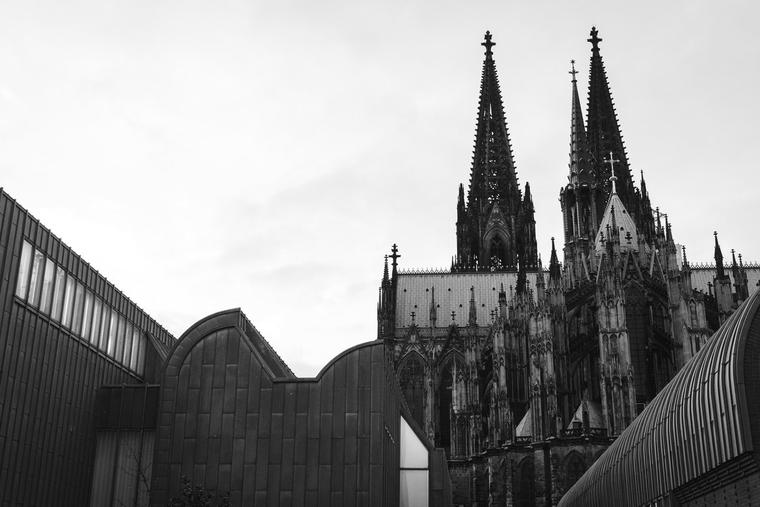‘Into the Deepak’: Vatican Conference Gives Forum to Chelsea Clinton, Dr. Oz and Jane Goodall, as Germany’s Catholic Bishops Choose to Ignore Pope Francis
COMMENTARY: The eclectic roster of speakers at recent Vatican conferences might help explain why the Church in Germany is moving ahead so determinedly to ignore Pope Francis.

The coordinated protest by priests in Germany last Monday, offering a “blessing for lovers,” which explicitly included same-sex couples, is just the latest indication that a sizable portion of Germany clergy, including bishops, is quite content to ignore directions from Rome.
Pope Francis has indicted plainly himself, and repeatedly through various Curial congregations, that the German “Synodal Path” threatens the unity of the Church, the truths of the faith and good order of canon law. There is no doubt that he wants the Church in Germany to abandon the “Synodal Path” as it is currently structured. It is equally clear that the German leadership, both clerical and lay, simply do not pay him heed.
How to explain that? Herewith one of those unrelated moments, a small detail that, while of no great importance in itself, has some explanatory power.
Last week, Deepak Chopra addressed a Vatican conference on health, hosted by the Pontifical Council for Culture. Chopra, along with Dr. Anthony Fauci, Jane Goodall and Chelsea Clinton, was among dozens of speakers on the broad topic of health in mind, body and soul. Chopra was interviewed by talk-show host and Oprah Winfrey protégé Dr. Mehmet Oz.
In fairness, Vatican conferences are not what they used to be. Serious people pay them less heed than in days gone by, when some of the leading authorities in the world would attend. Things took a decisive turn for the worse in 2016, when the Pontifical Academy of Social Sciences hosted Sen. Bernie Sanders — then in a hotly contested race against Hillary Clinton for the Democratic presidential nomination — and President Evo Morales, who sought to bring to Bolivia what the Castros had brought to Cuba and Hugh Chavez to Venezuela. It was politically provocative, but not academically serious.
By those standards, Chopra, the New Age alternative-medicine guru, is an understandable presence at a Vatican conference on health, incongruous as it seems.
More than 10 years ago, when then-Father Robert Barron launched his acclaimed Catholicism series, he began by inviting his viewers to consider Mark 10:32:
“And they were on the road, going up to Jerusalem, and Jesus was walking ahead of them; and they were amazed, and those who followed were afraid.”
“This very telling,” comments Father Barron, now an auxiliary bishops of Los Angeles. “One might be intrigued by a religious teacher. One might be captivated by a spiritual leader. But amazed and afraid? Then we recall that in the Old Testament, awe and fear are two standard responses to God.”
Indeed, Bishop Barron called his first chapter on Jesus “Amazed and Afraid.” His point was that Jesus was a disturbing, upsetting presence who revealed truths and did things that challenged the prevailing order of things. He was not a soothing presence offering a lucrative message. He was not, in fact, Deepak Chopra.
“Jesus is strange,” explains Bishop Barron. “I am going to resist the tendency to domesticate Jesus and to turn him into an ancient Deepak Chopra. … They were amazed and afraid. I don’t think anyone is really amazed and afraid of Deepak Chopra. They might find him insightful and helpful, but I doubt that they are amazed and afraid. But someone takes five loaves and two fish and feeds 5,000 — that’s a little scary. If we domesticate Jesus, we take that dimension away from him.”
Perhaps that might help explain why the Church in Germany is moving ahead so determinedly now. It is not that the Church’s liberal wing has changed its agenda much in the last few decades. The key points of the “Synodal Path” were being advanced in the 1990s. But when Rome spoke then, Germany heeded, albeit grudgingly.
Neither Pope St. John Paul II nor Benedict XVI were popular in Germany, notwithstanding that the former had studied modern German philosophy from the inside and that the latter was a native son. Nevertheless, when either spoke, there was an admixture of wonder and fear — amazement because of the philosophical and theological erudition of the Wojtyła-Ratzinger partnership, and fear, too.
John Paul threw Father Hans Küng out of his academic chair in theology, with Cardinal Ratzinger’s backing, and neither would let the prestige of Germany scholarship or the power of German money sway their teaching. To the contrary, they brought major, generational projects to completion in the face of fierce opposition in Germany, namely the Catechism of the Catholic Church (1992) and Veritatis Splendor (1993).
Now, it appears that, despite the Church’s leaders in Germany’s obvious affection for Pope Francis, the Vicar of Christ leaves them neither amazed nor afraid. Leading German bishops indicate, when the Holy Father writes them a blistering cease-and-desist letter, that they will take his views into account. When multiple Vatican congregations order a stop, their objections are noted to be included as one point of view among many. They regard Rome as a bit like Deepak Chopra, someone with some interesting insights and useful ideas, but not an authoritative teacher who commands deference, let alone obedience.
One could imagine Deepak Chopra feeling quite at home in the sessions of the German “Synodal Path.” And while Chopra was not invited to speak about doctrinal or moral matters in his Vatican conversation with Dr. Oz, his presence in Rome might suggest why there are few in Germany who neither are amazed nor afraid.
















